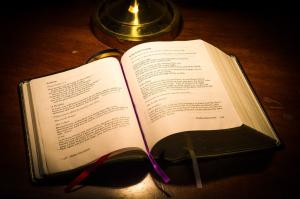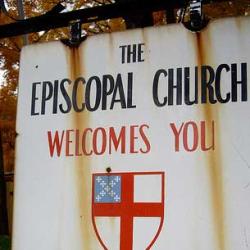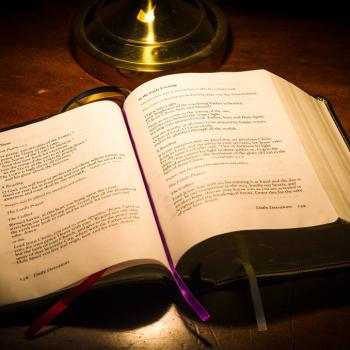In How and Why Books Matter: Essays on the Social Function of Iconic Tasks, James Watts – along with others – explores the role that books have in the life of communities:
Religious and secular communities ritualize some books in one, two, or three dimensions. They ritualize the dimension of semantic interpretation through teaching, preaching, and scholarly commentary. . . . Communities also ritualize a text’s expressive dimension through public reading, recitation, and song, and also by reproducing its contents in art, theatre and film. . . . A third textual dimension, the iconic dimension, gets ritualized by manipulating the physical text, decorating it, and displaying it.[1]
Used in this way, Watts notes that “physical books mediate social value and power within and between religious communities, nations, academic disciplines, and societies both ancient and modern.”
In the Anglican tradition – apart from the Bible and particularly, the Gospels – there could hardly be a better description of the mediating value and power of the Book of Common Prayer. The Prayerbook shapes our worship. It is further imbedded in our lives through its use. Its language furnishes the DNA of our prayers. Its content inculcates the theology of our tradition; and because the Prayerbook’s content is deeply connected with manual acts and rituals, it is not only intimately connected with how we think about our faith, it is also shapes the embodiment of our worship and the life of our communities.
If – like me – you are an Anglo-Catholic (an Episcopalian committed to Catholic and Orthodox understandings of what happens in our liturgy), the Prayerbook is about even more. Its liturgies serve as the enactment of God’s saving, healing work in our lives. In baptism, for example, we are buried and raised in Christ. In the Eucharist we receive the body and blood of Christ. The liturgy is not “just a symbol” or simply “a ritual”.
Unfortunately, even the categories that Watts and his colleagues use are absent from conversations about the Book of Common Prayer. The failure to appreciate just what is at stake is reflected in the focus of those revisions, which dwells on largely sociological categories. General Convention Resolution, A077 is a case in point:
GC Resolution A077 Additional Guidance for Inclusive and Metaphorical Language (From the Task Force on Individuals with Mental Illness)
Resolved, That the 81st General Convention direct the Standing Commission on Liturgy and Music to include additional guidance in The Guidelines for Expansive and Inclusive Language regarding nonstigmatized language in the inclusive language section and non-ableist language in the metaphorical language section when drafting revisions and new liturgical materials; and be it further
Resolved, That when liturgical materials in languages other than English are developed for use in the Episcopal Church that they follow, to the greatest degree possible, the spirit and intent of these guidelines; and be it further
Resolved, That the 81st General Convention commend these guidelines to all persons who write or speak on behalf of the church for their serious reflection and consideration; and be it further
Resolved, That these guidelines be referred to Dioceses, Interim Bodies of General Convention, Executive Council and related bodies, Provinces, Church Publishing, and other organizations of the church for serious reflection and consideration when writing, speaking, or educating on behalf of the church.[2]
But the larger problem with most conversations about Prayerbook revision is the absence of any awareness of what it would mean for The Episcopal Church to be shaped, not by a “book” but by a web-based “menu”. In the middle of one conversation about the subject of revision, I was asked why common prayer, limited to select Eucharistic liturgies, was so important to me. The very way the question was framed betrayed the prevailing mindset, and I attempted to underline exactly what I believe is at stake.
Insistence on a book has nothing to do with me at all. It is important to the church and that is what matters. The value of the Episcopal Church lies in its rooting in the early church’s liturgy and the apostolic tradition. In turn, that rooting is given expression in our liturgy. If we reorient the church to a menu of liturgies and privilege liturgical variety and theological self-expression and representation, then the argument for The Episcopal Church and the Anglican tradition evaporates. There are already churches that offer this and the remaining liturgical patina that might cling to Episcopal churches is hardly a good argument for our denomination’s continued existence.
The larger church would be just as well off with a pan-Protestant amalgam, embracing most, if not all, of the mainline denominations. Then the only remaining liturgical questions will be (1) whether we have enough liturgies, so that every difference between us is represented; and (2) the question of whether the language is sufficiently up-to-date, that it celebrates those differences.
Maybe that’s where the conversation about the Prayerbook is headed: a menu of liturgies, celebrating a variety of sociological alignments. But – with the theological and liturgical issues at stake – I don’t have any interest in it and I doubt that others will. It is possible to care deeply about the “dignity of all human beings” or – more precisely – the conviction that all human beings are made in the image of God, without abandoning the conviction that the Prayerbook itself speaks to that conviction, offering the one thing that transcends and heals our differences.
[1] https://www.equinoxpub.com/home/books-matter/
[2]https://extranet.generalconvention.org/staff/files/download/32382?_gl=1*t1brs9*_ga*MTc4NjQ1NjIxNi4xNzA0OTE0Mzgy*_ga_8C0Q9J2J2F*MTcwODUzNDYyNi4xMC4xLjE3MDg1MzQ2MjkuMC4wLjA&fbclid=IwAR2r_9-XRsi4tDFi4p3xbiMcAr57yuGglIHfdwMi-UuV9OFbGj6Jt7pic64_aem_AUL_sK6YdsW5t7nj3mPRHdFeqUNN0XiW5xUWigYudWSXDcBIrXVLoXRtdOGtne92DWVo5FR-_STA2ICr8LRqVrwb













